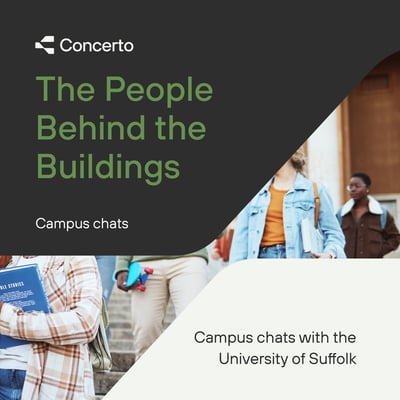
Campus chats with the University of Suffolk
Transforming university estates: Data, sustainability and student experience at University of Suffolk
In our latest podcast episode on estate data strategies, we delved into how the education sector is embracing transformation; with a focus on the University of Suffolk. Guests included Matt Hickley from Bellrock and Nigel Lucker, Director of Estates and Facilities at the University of Suffolk.
The conversation was packed with insight into how estates can move from traditional management approaches to becoming digitally enabled, sustainability-led powerhouses. Here's a deep dive into the key themes we explored.
From legacy to leading: The Suffolk story
Nigel's career has covered varied parts of the public sector, including the British Transport Police and the Foreign Office, but Suffolk is his first higher education post. Despite this, he's made fast progress by focusing on what matters most: the student experience.
“Everything we do around estates is about enabling the core business,” he said. “And our core customer is the student.”
Suffolk's estate is a blend of old and new buildings. An evolving portfolio in a picturesque waterfront setting. Over the past few years, Nigel's team has focused on upgrading spaces, improving utilisation and reimagining how facilities support modern learning styles. Whether students want quiet, collaborative or flexible space, Suffolk's strategy ensures the estate is responsive.
Tackling pressures head-on
Like most institutions, Suffolk faces challenges: budget constraints, compliance requirements and changing learning environments post-pandemic.
But these constraints have become opportunities. Tight budgets, Nigel noted, “help focus the mind.” That focus has led to significant achievements: reducing maintenance backlogs, enhancing the student experience and embedding flexibility into the estate's physical design.
The power of data in estate management
One of the most compelling parts of the conversation centred around the use of data and increasingly, AI ,to drive smarter decision-making.
Suffolk has made strides using existing data sources, like timetabling information, to optimise services such as cleaning. Instead of relying on static schedules, data now dictates where attention is needed, saving money and reducing wasted effort.
“We've cleared all our priority one and two issues, and backlog is down to around 12%,” said Nigel
AI is also finding a role as what Nigel jokingly called the “12th member” of his team. From summarising reports to identifying areas of inefficiency, it's proving to be a valuable support tool.
Sustainability: From buzzword to business strategy
Unlike many institutions that have overcommitted to unrealistic net-zero targets, Suffolk has taken a pragmatic, phased approach. Focusing first on Scope 1 and 2 emissions (those directly under its control) the university is steadily decarbonising.
Recent recognitions, like a silver EcoCampus award and a local sustainability award, reflect a strategy that's not just ambitious, but actionable.
Highlights include:
- A push to eliminate gas heating by next year
- Investment in EV infrastructure
- 20% green space allocation in all new projects
- Close collaboration with local authorities on sustainable transport
Staff and student wellbeing: A shared focus
Nigel emphasised that student experience doesn't end with students, it includes staff too. The estates team routinely engages in consultations with both groups before, during and after projects.
“Retention is high, and satisfaction with estates-related services has gone up 40%,” he shared.
Surveys run at multiple project stages help capture and act on feedback in real time.
The estate is also embedded into university-wide governance. From sustainability to wellbeing, the team ensures its voice and that of students, is heard at every level.
Looking to the future
When asked what success would look like five years from now, Nigel was clear:
“I want our estate to be recognised not just as first-class facilities for students, but as a point of pride for the whole region.”
That means continuing to modernise, decarbonise and improve, with students and staff as the central focus.
Final thoughts: Unsung heroes behind the scenes
Nigel concluded with a heartfelt reminder about the people behind the estate:
“You might not see them every day, but the dedication of the team to give students the best experience possible is unmatched.”
He also had a word of advice for those outside estates: trust the process. Projects take time, and understanding the full lifecycle, from planning to procurement, is key to effective collaboration.
In summary
From leveraging AI and data to deliver smarter services, to embedding sustainability and wellbeing into every square metre, the University of Suffolk is redefining what a modern university estate can look like.
Whether you're in education, facilities management or tech consulting, this episode offered plenty of food for thought on how to align estates strategy with institutional goals and why embracing change is not just necessary, but powerful.
The People Behind the Buildings
The new podcast on the block, for all the estate and property geeks to listen to on their lunch break.


